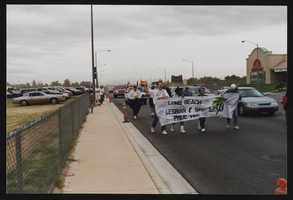Search the Special Collections and Archives Portal
Search Results
Susanne E. Morrow oral history interview
Identifier
Abstract
Oral history interview with Susanne E. Morrow conducted by Dennis McBride on September 29, 2000 for the Las Vegas Gay, Lesbian, Bisexual and Transgender Archives Oral History Project. Morrow begins by discussing her childhood in a military family, her marriage and children, and her move to Genoa, Nevada in 1961. She then talks about her move to Carson City, Nevada in 1962 and her twenty-nine year career as a journalist and city editor for the Nevada Appeal newspaper. The remainder of the interview focuses on Morrow's memories of the 1965 assault on then Chief Justice of the Nevada Supreme Court, Frank McManee, and the subsequent judicial actions and court decisions that reflected attitudes toward homosexuality prevalent in society at the time.
Archival Collection
Valorie J. Vega oral history interview
Identifier
Abstract
Oral history interview with Valorie J. Vega conducted by Laurents Bañuelos-Benitez on November 19, 2018 for the Latinx Voices of Southern Nevada Oral History Project. In this interview, Vega discusses her upbringing in Van Nuys, California. She describes her father’s employment with the Los Angeles County Fire Department, her attendance at California State University, Northridge, and majoring in Spanish with a minor in Chicano studies. Vega recalls entering a master’s program for Spanish interpretation, moving to Las Vegas, Nevada in 1978, and becoming a supervisor for court interpreters. Later, Vega talks about enrolling in law school at the University of Southern California (USC), working as a Clark County deputy attorney, and later becoming a judge. Lastly, Vega discusses her experience being a female Hispanic judge, and her involvement with the Huellas Program at the University of Nevada, Las Vegas (UNLV).
Archival Collection
Esther Lynn oral history interview
Identifier
Abstract
Oral history interview with Esther Lynn conducted by Dennis McBride on August 24, 2000 for the Las Vegas Gay, Lesbian, Bisexual and Transgender Archives Oral History Project. Lynn moved to Las Vegas, Nevada from Los Angeles, California in 1976. She is a writer and editor, focusing on the Las Vegas entertainment scene, with by-lines in many local and national publications.
Archival Collection
H. Edward (Eddie) Anderson oral history interview
Identifier
Abstract
Oral history interview with Eddie Anderson conducted by Dennis McBride on October 11 and 14, 2000 for the Las Vegas Gay Archives Oral History Project. Anderson speaks about his role in advocating for LGBT rights, specifically his participation in the various political and social movements during previous decades. Additionally, Anderson speaks about his experiences and involvement with the Democratic Party and the various individuals and political figures who assisted with his cause.
Archival Collection
Pat Spearman oral history interview
Identifier
Abstract
Oral history interview with Pat Spearman conducted by Lisa McAllister on March 03, 2016 for the African Americans in Las Vegas: a Collaborative Oral History Project. In this interview, Spearman discusses her experiences in the military and becoming a minister at United Methodist Church in Las Vegas, Nevada. She describes what it was like to serve in the military as a gay woman and telling church members about her sexuality. Spearman then talks about the African American gay community in Las Vegas and the intersectionality of race, class, religion, sexuality, and politics. Lastly, Spearman discusses her plans to get re-elected as a Nevada State Senator.
Archival Collection

Long Beach Lesbian and Gay Pride, Inc. in the second annual Gay Pride parade: photographic print
Date
Archival Collection
Description
Image

Transcript of interview with Hazel Gay by Claytee D. White, December 2, 1995
Date
Archival Collection
Description
Interview with Hazel Gay conducted by Claytee D. White on December 2, 1995. Hazel and her husband Jimmy Gay moved to Las Vegas in 1946, becoming leaders in the African American community during the civil rights era.
Text
Aquiles Garcia oral history interview
Identifier
Abstract
Oral history interview with Aquiles Garcia conducted by Claytee D. White on January 10 and February 20, 2015 for the Boyer Early Las Vegas Oral History Project. Garcia discusses the political atmosphere and risks of being gay in Juan Perón’s Argentina in the 1940s, Las Vegas, Nevada life in the late 1950s and early 1960s, and his dual Las Vegas careers as a dancer and a casino dealer throughout the second half of the twentieth century.
Archival Collection
David Parks oral history interview
Identifier
Abstract
Oral history interview with David Parks conducted by Dennis McBride on January 31, 2007 for the Las Vegas Gay, Lesbian, Bisexual and Transgender Archives Oral History Project. In this interview, Parks, a member of the Nevada senate, discusses working on a Nevada anti-bullying bill and a family fairness bill, which stated that any two persons could have another person as a recipient beneficiary. Park describes dealing with opposition to the family fairness bill with some people arguing that it changes the traditional definition of family. Parks recalls running against a man with a similar name, David F. Parks, in a 2002 legislative assembly election.
Archival Collection
